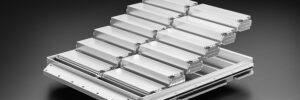
In September, FREYR Battery and Japanese electric motor producer Nidec announced plans to establish a downstream joint venture to produce battery modules and packs.
Now the new JV, Nidec Energy, has been officially established. Mass production is expected to commence in 2025, and the goal is to manufacture more than 8 GWh per year of modules and packs from 2027, and 12 GWh per year by 2030.
Nidec Energy’s module production is expected to be integrated into FREYR’s Giga Arctic facility in Mo i Rana, Norway, which is currently under construction. The joint venture is expected to invest more than $127 million by 2030, and eventually employ more than 300 people, the majority of whom will be based in Mo i Rana.
“The official incorporation of the joint venture with Nidec is a significant milestone in our journey to bring speed, scale and sustainability to battery storage solutions globally,” said Tom Einar Jensen, FREYR’s co-founder and CEO. “This partnership will enable us to accelerate the development of our highly competitive, low-carbon modules and battery pack solutions for industrial and utility-grade applications.”
“This joint venture will support the development of our fast-growing ESS business and aligns with our firm commitment to develop technologies that contribute to reducing global carbon emissions,” said Laurent Demortier, President of Nidec’s Energy and Infrastructure Division. “For us, FREYR is a natural partner with clean energy and sustainability ambitions. They also bring expertise and resources related to battery cell design and manufacturing, which includes the market-leading 24M SemiSolid lithium-ion battery cell technology.”
As one of the prerequisites to establishing the joint venture, a package of 24M Technologies sample cells was sent to a third-party laboratory for testing to measure the capacity, charge and discharge profiles of the cells.
Key results from sample cell testing, according to the companies:
- The sample cells exhibited top quartile gravimetric energy density performance for LFP graphite batteries.
- Characterization analysis demonstrated very similar behavior across the cells, and behavior remained stable across several cycles with relatively low variability across the sample pool, which provided a positive indication of cell quality.
- The cells exhibited best-in-class performance for thermal stability, indicating robust safety characteristics.
Source: FREYR Battery via Battery Tech News
from Charged EVs https://ift.tt/wPgRMNH


No comments:
Post a Comment